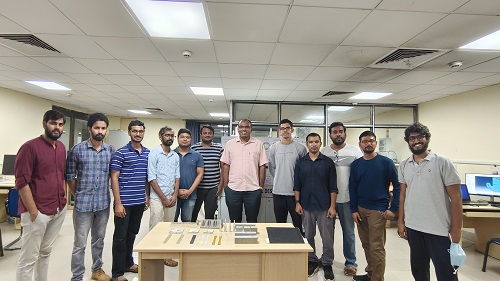
Guwahati: Indian Institute of Technology Guwahati research team led by Dr. Nelson Muthu, Assistant Professor, Department of Mechanical Engineering, has developed new modeling methods to assess the probability of failure of composite materials. For this, the researchers have used a combination of Machine Learning tools and state-of-art sampling techniques, to model and predict the failure and other mechanical properties of composite materials used in the aerospace and automobile sector.
This combination of these tools is able to better predict the failure of these materials over the multiple probability technique such as Monte Carlo simulation. The results of the team’s latest work have been published in the prestigious journal, Composite Structures, in a paper co-authored by Dr. Muthu along with this research scholars: Mr. Paladugu Rakesh, Mr. Aditya More, and Mr. Munna Kumar.
Composite materials are made of two or more components and are extensively used in all kinds of aerospace, automobile, and construction applications because of favorable properties such as excellent corrosion resistance, high strength, and stiffness-to-weight ratios, durability, increased fatigue life, affordable cost, etc. The simplest type of composite is Fiber-reinforced-Plastics or FRP, which are widely used today.
Specialized fiber reinforced composites are used in aerospace, for making specialized aircraft structures. The fuselage, wings, tail, doors, and interior of aircraft, for example, are made of composite materials. The Boeing 787 Dreamliner aircraft is 80% composite by volume, which reduces fuel use by 20-25% compared to its predecessors.
Highlighting the importance of his research, Dr. Nelson Muthu, Assistant Professor, Department of Mechanical Engineering, IIT Guwahati, said, “Despite their wide use, composite materials can fail due to problems such as fiber-matrix debonding, delamination, fiber misalignment, matrix cracking, density variation, broken fibers, impact damage, etc. We need to understand and predict such failures so the composite and the component can be designed accordingly and reduce the risk of failure.”
Computational modeling studies such as Monte Carlo simulations are often used to understand and predict the failure of composite materials. However, these multiple probability methods consume a lot of computer time and memory because composite properties are affected by many factors such as the distribution of fiber and matrix characteristics (microscale), laminate bonding (mesoscale), and product macrolevel design (macroscale).
“Although computers are getting more powerful, it is still unrealistic to depend only on single simulation codes to predict properties that are dependent on multiple factors”, said the lead researcher.
The IIT Guwahati team developed a computationally efficient multiscale metamodel-based approach that combines machine learning tools like support vector machines, among others, and sampling tools, such as Latin hypercube, to assess the failure risk in composites with many sources of uncertainty.
While explaining the technicalities of his research, Dr Muthu explained, “We performed experiments to determine the uncertainties in the microscale and established the variation of the properties in the mesoscale using the computational homogenization technique within the finite element modeling framework. The uncertainty in the mesoscale was also estimated, and this information was transported to the macroscale simulations.”
The metamodeling approach reduced the computational effort by about 95% compared to the Monte Carlo simulation. This was also a significant improvement in determining the risk associated with the design and development process.
Apart from this research on the fracture and failure modeling of composites, Dr. Muthu’s group also works on biomedical device innovation. The researchers routinely collaborate with industry partners like VSSC-ISRO, TATA Steel (TSAMRC), SABIC, and Robert Bosch Engineering and Business Solutions Private Limited and work towards solving practical problems in the industry.
Click Here for More Science & Technology
